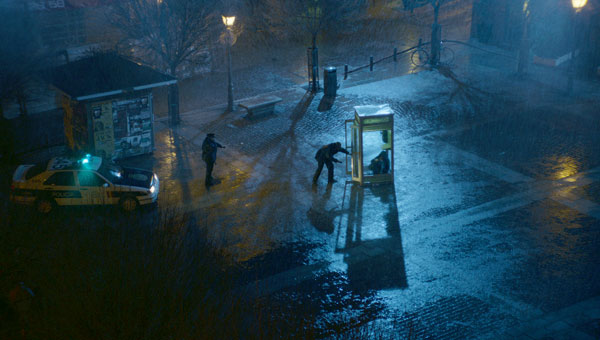 Back to selection
Back to selection
Five Questions with The Imposter Director Bart Layton

More and more often different mediums and genres of filmmaking are being meshed together and Bart Layton’s newest documentary The Imposter is no different. The film’s official synopsis declares, “Documentary meets Film Noir in this astonishing true story which has all the twists and turns of a great thriller.” But this is not just a hoax to get people into the theatre. Based on an extremely bizarre story of a young man who infiltrates a family by posing as their missing son, the film follows an intricate plot of testimonies that aim to recreate the story’s noir-ish tone. Just as the adventure of making the film and uncovering the facts led Layton and his producer on an unbelievable trip, The Imposter aims to leave audiences in a similar state of bewilderment.
—
Filmmaker: How did you get involved with this story? What encouraged you to make this documentary?
Layton: In 2009 I happened upon an article in a Spanish magazine about Frédéric Bourdin, AKA Le Chaméléon – a Frenchman who had traveled the length and breadth of Europe passing himself off as an abandoned child. A quick Internet trawl threw up dozens of similar articles about him including a long piece from the New Yorker that described his time in Texas. The story was incredibly hard to believe – a twenty-three year-old French-Algerian man successfully steals the identity of a missing Texan child and begins a new life within the family posing as their son? I knew that this would make an incredible film but wondered if perhaps the imposter himself wasn’t the whole story but was perhaps a way into a more interesting film about deception and, in particular, self-deception.
Filmmaker: What techniques did you use to avoid making the re-enactments in your film feel hokey, cheesy, or like a crime show episode?
Layton: Re-enactment is a pretty dirty word in TV let alone in film so it was vital to find a visual style that didn’t feel like ‘re-enactment’, that felt cinematic and also fitting to a story as unusual as this one. My idea was to play with notions of memory and subjectivity – not to try to create some kind of faux archive that the audience would be invited to believe was real – instead I wanted to create something vivid and almost dream-like and not a great deal like reality at all. So my friend and DP, the amazing Erik Wilson, and I set about creating a somewhat film-noir world full of atmosphere and conflicting colour temperatures. My intention was also to blur the lines between documentary and drama – there are moments in the film when the interviewee and the actor intersect or overlap in their speech or movement and moments when the actor seems to address the camera – the idea here is to weave the past and present together seamlessly but also remind the audience that this is a subjective account of the past. From the very first scene, I wanted to make clear in the visualization that this is not what “must” have happened but an attempt to illustrate each person’s version of what they want to tell you happened. My big plan was to try to recreate that movie that plays in your head when someone tells you a truly extraordinary story.
Filmmaker: When you make a documentary how physically invested do you find yourself becoming in the story? Especially one that is as thrilling as this.
Layton: With this one it was hard not become totally physically and mentally absorbed in the making of it – as my long-suffering missus will testify. There were times when it felt like being in a detective story – and a slightly far-fetched one at that. My co–producer, Poppy, and I went into almost every interview convinced that we understood broadly what had happened, and walked out with an almost diametrically opposite conviction. So the process of making the film took us on an often bewildering and very twisting journey and it was this that I wanted to try to reflect in the structure of the film itself.
Filmmaker: What feeling do you expect or hope audiences have after they have watched The Imposter?
Layton: I want audiences to go on an emotional journey and to leave the film with their heads buzzing with thoughts, questions and debate. It’s the kind of film I hope people will want to go and discuss at length afterwards in the pub. I don’t want to reveal too much of the narrative ahead of people seeing the film but there are some twists in the story that I don’t think anyone would be likely to predict and I hope people will discover and respond to those when they see the film. I hope the film ultimately speaks to thoughts and ideas which are bigger than this one particular story – about the lies we want to believe and the truths we construct for ourselves.
Filmmaker: What was the hardest part of the production?
Layton: The hardest part was figuring out how to make sense of all the subjective and often conflicting versions of events described by each of the interviewees – this paired with the perennial problem of how to condense something that had happened over many months into just 90 minutes. The solution seemed to me to try to follow each of those characters’ journeys more or less chronologically and allow the story to unfold for the audience in a way that reflected the twists and turns that each of the interviews threw up. The other big challenge, as discussed, was finding a visual language to describe the past that was unlike anything you might have seen in a documentary before. I only hope we got some way to achieving that.
